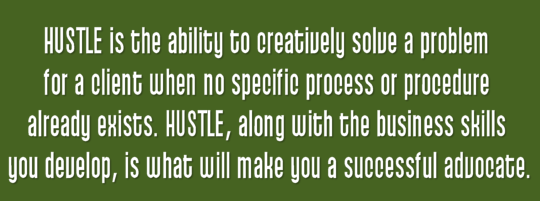Earlier this year we hosted one of our APHA Workshop weekends*, with about 30 individuals who are somewhere in the process of growing an advocacy practice.
The APHA Workshops were originally designed to support the BUSINESS of advocacy only. The idea was that most advocates have abundant skills and abilities to advocate – they’ve advocated for themselves and loved ones, and sometimes non-family patients for years. What they didn’t know was how to successfully start and run a sustainable business / practice to allow them to do their advocacy work. For five years, we hosted those original workshops all over the country, and student-advocates provided feedback indicating they were worthwhile.
Until… about a year ago it became clear that there was one major piece in the teaching of the budding profession of advocacy that was missing, a piece that no one had really named yet. Those of us who are leaders in the profession could describe it, but we had trouble honing in on a concise description, or definition, or better yet, a single word that would allow us to communicate about it.
This became even clearer at this year’s first workshop, mentioned above, where we added a component to address that missing piece. Some attendees, those new to advocacy, struggled to solve the real life patient / caregiver problems we posed. Observing some of the struggle helped me figure it out….
So today I’m going to name it, describe it, and then ask YOU to provide examples.
Consider:A client needs something the advocate has never had to arrange or supply before, a scenario faced everyday by new advocates. The advocate may not even realize she needs to arrange or supply it, or she believes she needs permission to accomplish it, or maybe she is afraid to rock the boat…
Her next steps require “HUSTLE.”
HUSTLE is about getting your client from Situation A to the Solution B that he or she needs or chooses, often in a different direction from what the healthcare system would ordinarily offer, by finding a creative solution when no specific process or procedure already exists. It requires quick assessment, thinking on one’s feet, then mastering the art of persuasion to procure the solution the client needs and wants.
Using HUSTLE is a far better solution than waiting around for an answer that may not yet exist!
Now, just to set the record straight, I’m not talking about a hustle where one or more parties is burned, nor am I channeling John Travolta or Van McCoy. Instead I’m talking about a hustle that ends up achieving what is necessary to move one’s client forward, even if the healthcare system is resistant; even if it stands squarely in your way.
Here’s more:
As advocates get started, they are often afraid to make waves. Even if they have advocated in many rock-the-boat ways for loved ones for years, once they are working with someone else, someone who might not understand their approach or personality, someone who might judge them as less-than-professional, they are afraid to employ “creative solutions” – or HUSTLE.
They come to APHA, or the Health Advocate business books, or to our APHA discussion forum, or sometimes they just send me an email: this is happening, but my client needs this, so what should I do?
HUSTLE provides them with their answer. Hustle tells them how to create a win-win, even if it has never been done that way before. Hustle gives them the chutzpah to find the right decision-makers or methods or resources to change the course. Hustle gives them permission to challenge the status quo to improve their clients’ situations.
Hustle means they do what they can, when they can, how they can, knowing that no “right” process or procedure may yet exist.
It’s easy to see where reticence comes from. Many have worked in large bureaucracies prior to their shift to advocacy. They have been nurses, social workers, teachers, or other positions, working within large bureaucratic structures that have already-defined policies or procedures for almost any scenario. Thinking creatively might require muscles they haven’t used in their entire careers to that point. Sometimes thinking creatively in a bureaucracy can even get them fired.
In their experience to this point, “If A, then B”. No wiggle room.
So their first few client service experiences are difficult because they THINK they have to follow some rule that someone else has already defined, or they are afraid to break some existing rule, until…. eventually, budding advocates realize that not only does no policy or procedure already exist, but that – ta da! – their success, and their client’s success, will only result from their creative thinking – making it up as they go along.
Their new reality as a professional, independent advocate means “If A, then Z – or maybe X – or possibly K…. or H… just whatever works”.
That’s HUSTLE!
Those of us who have advocated for loved ones (a child, a spouse, a parent) have probably flexed those creative thinking muscles without realizing that’s what we were doing. When something negative befell our loved one, we went to the ends of the earth to make it right. So maybe that’s what it requires for you to get your HUSTLE… pretend you are your client’s loved one and give it all you’ve got.
Once you understand this concept, once you’ve hustled for a few clients, once you’ve seen what you can do when you problem solve creatively, and clients benefit from, and appreciate your hard work – THEN you’ll begin to love it too. A successful hustle is VERY satisfying. It’s a key component in advocacy job satisfaction.

HUSTLE, along with the business skills you develop, is what will get your clients what they need, and make you a successful advocate.
Your turn! For those of you who understand HUSTLE – will you help us out? When did you creatively solve a healthcare system-related problem for a client? What was the situation? What did you need to do? What back doors did you walk through? How did it benefit your client?
This is a learning opportunity for us all: please share your hustle!
LEARN ABOUT APHA MEMBERSHIP | MORE REASONS PATIENTS NEED ADVOCATES | MASTER LIST OF PRACTICE RESOURCES
Nancy Ruffner, APHA Member, has penned this post in response to our request for stories about HUSTLE.
*Interested in attending our next APHA Workshops? Here’s more information. Yes – we’ll teach you to hustle!





